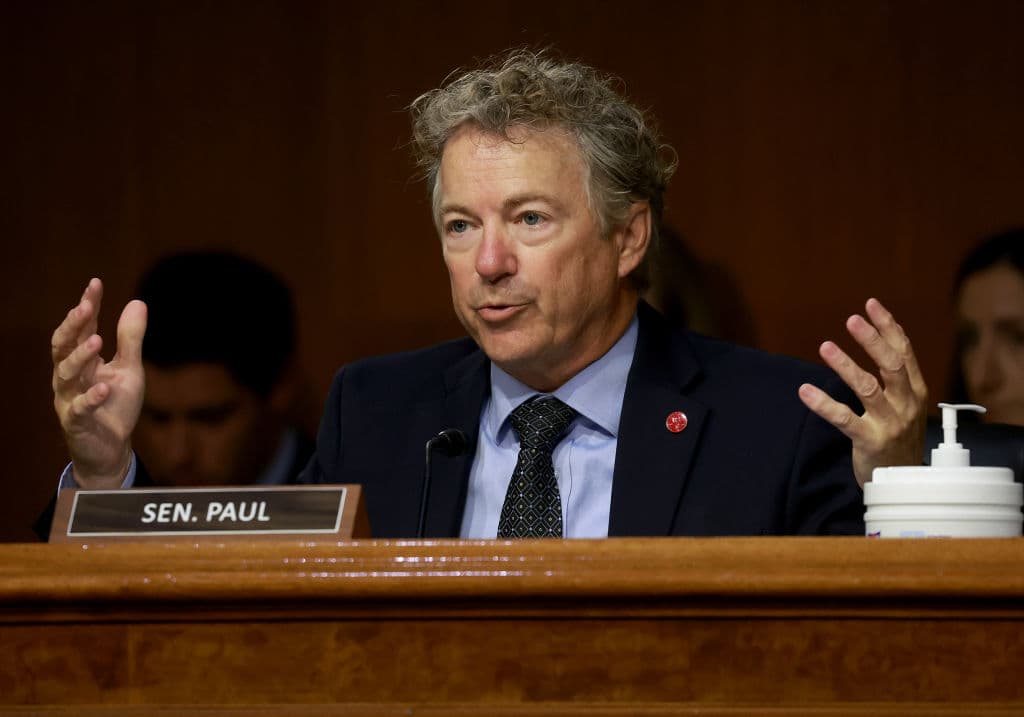Exclusive: Senator Paul Doubles Down on Call for Ceasefire in Ukraine, as NATO Official Suggests Ukraine Cede Territory
Remarks underscore a mounting frustration in Europe and Washington with the war.

President Biden, you should have seen this coming. In the first of a striking pair of developments, a senior NATO official has suggested that Ukraine could gain admittance to the military alliance in exchange for ceding territory to Russia.
Separately, a Republican of Kentucky, Senator Paul, who for a number of reasons disfavors Ukraine’s admission to the North Atlantic Treaty, exclusively tells the Sun that Russia and Ukraine “should agree to a ceasefire so that peace talks may begin.”
The two developments throw a curveball — or a slider — at Mr. Biden’s strategy of providing military aid to Ukraine for “as long as it takes,” as the secretary of state, Antony Blinken, has phrased it. It also puts Ukraine, the distant country that was at the core of President Trump’s first impeachment, back on center stage at Washington. This just as a well-oiled Ukrainian counteroffensive has stalled and public opposition to more financial support for Ukraine is growing.
The NATO chief of staff, Stian Jenssen, said at a panel debate in Norway on Tuesday, “I think that a solution for Ukraine could be to give up territory and get NATO membership in return.” He added that Russia is “struggling enormously militarily” and that it was unrealistic that it can take new territories.
Now it is a question of “what Ukraine manages to take back,” Mr. Jenssen said. The remarks were reported in Norway’s most popular newspaper, Verdens Gang. Senator Paul has frequently been at odds with the Biden administration’s approach to the war in Ukraine, as the Sun has reported. Those concerns are variegated but boil down to two things: national security and expense.
“Although we sympathize with the resistance to Vladimir Putin’s invasion, a security guarantee recklessly risks a direct clash with a nuclear power,” Dr. Paul told the Sun, adding, “While Kyiv and Moscow will settle territorial matters, the U.S. is in no position to offer a security guarantee to Ukraine. The United States is over $32 trillion in debt and provided so much aid to Ukraine that we now have a critical shortage of ammunition that will take years to resupply.”
Dr. Paul’s criticism of Mr. Biden’s financial largesse with respect to Ukraine is unreserved: “Since the war began, our government directed more than $113 billion in taxpayer-provided assistance to Ukraine, surpassing all European allies combined,” he said.
“To put it in perspective,” Dr. Paul added, “this amount is nearly 18 times the $6.4 billion we spend on cancer research every year. And the Biden administration recently announced it will seek an additional $24 billion for Ukraine. We cannot spend such a massive sum this quickly without waste, fraud, and abuse.”
The senator recently proposed an amendment to the defense authorization bill that would have entrusted an independent inspector general to oversee and track how funds are spent in Ukraine, but it was not adopted.
For Dr. Paul there is a connection between the issues of financial support and an end to the conflict that started when Russia launched its invasion of Ukraine in February 2022. “Ultimately, only Russia and Ukraine can decide when to begin peace negotiations,” he said, “but unlimited armaments for Ukraine likely deters them from engaging in peace talks.”
“Also, unrealistic preconditions such as Russia returning Crimea before negotiations can begin delays peace talks,” the senator told the Sun. “The likely result of a prolonged war is the continued suffering of Ukraine and its people. The parties should agree to a ceasefire so that peace talks may begin.”
Both the senator’s and NATO chief of staff’s remarks underscore a frustration in Europe and Washington with a war that has already caused thousands of casualties on both sides, endangered the global food and energy supply, and stirred long-simmering tensions among countries that border Ukraine.
The powers that be at Kyiv and Moscow were quick to enter the rhetorical fray that started in Norway. The head of President Zelensky’s Servant of the People party, Davyd Arakhamiia, said on his Telegram channel, “Talking about [Ukraine] ceding our territories in exchange for anything only invites aggression. We can already see this in Moscow’s reaction.”
That Moscow reaction was swift. A former Russian president, Dmitry Medvedev, current deputy chairman of Russia’s security council, suggested on his Telegram channel that if Ukraine were to agree to cede territory to join NATO, “the Kyiv authorities will have to leave even Kyiv itself, the capital of Ancient Russia.”
Adding fuel to the fire, Mr. Medvedev stated that in such an unlikely scenario, “well, then they should move the capital to Lviv. If, of course, the Poles agree.”
Lviv is in western Ukraine and close to the border with Poland, a long way from Russian-occupied Crimea. That peninsula now, given rapidly changing developments, may or may not be at the crux of the matter of hypothetical territorial concessions.
Dr. Paul, a ranking member of the Senate Committee on Foreign Relations, has previously hinted that a federalist-style approach to administration of Ukraine’s eastern Donbas region could bring “a great deal of autonomy in exchange for support of the national government.”
Dr. Paul has stated that “peace will not be possible as long as our government’s position is ‘my way or the highway.’” Mr. Biden’s tack on Ukraine makes the senator bristle, in part because it lacks clarity.
Mr. Jenssen said that “it must be up to Ukraine to decide when and on what terms they want to negotiate.” Glossing over the vicissitudes of eastern European geography, which is what the White House appears to be doing, has rarely turned out well for anyone.

